#ng see-yuen
Text
Movie Review | The Secret Rivals (Ng, 1976)
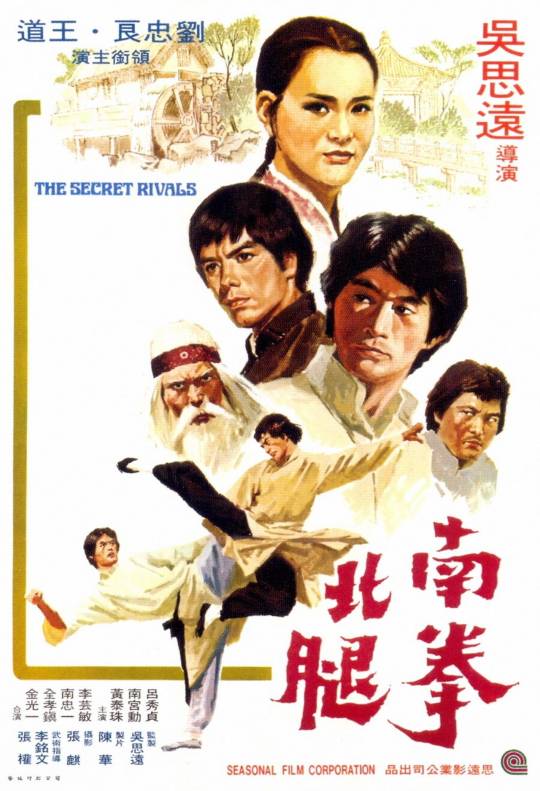
Like a lot of these somewhat less celebrated kung fu movies, I had to watch this in an English dub, and like a lot of these somewhat less celebrated kung fu movies, all the voices except those of the heroes were in a constant state of shrieking or cackling. Obviously the main villain should do his share of cackling. But the children shriek. The good looking lady who presents a possible love interest shrieks. A bald guy who plays a minor baddie has a more guttural cackle. He and his goons decide to antagonize some poor bastard and you hear all of them shriek and cackle at the same time and the kid charges in and starts shrieking and one begins to wonder if this scene would have played more tolerably in its original audio.
That being said, this is not a purely unpleasant auditory experience, thanks to some deftly applied "borrowed" music. During a recent viewing of Cirio H. Santiago's Firecracker, I noticed how the liberal use of the Shogun Assassin score significantly upped the energy level. (The heroine in that one was played by Jillian Kesner, who I understand once played the girlfriend of the Fonz and was the real-life wife of Gary Graver, and let's just say she wasn't hired for her martial arts prowess.) Here, we open with Ennio Morricone's theme for The Big Gundown, and let's just say that it makes this relatively small scale movie feel a lot more epic. (The Korean forest locations also help greatly in this respect, and it was nice to see this in a pretty decent transfer on Tubi, as a lot of these movies are only available in much worse condition.) And it definitely adds to the excitement when that same theme is deployed during a training sequence when one of the heroes learns how to fight by kicking. But lest you assume that's the only music that's well used, I must note that the arrival of the main villain is announced by the James Bond theme.
There is a plot here, about a pretty tepid rivalry that is not easy to invest in, and let's just say that when you notice both leads are sympathetic and a more overtly villainous character arrives (with the aforementioned Bond theme queue), you won't win any prizes for guessing how this turns out. Most of this is pretty episodic, with an early incident involving an asshole foreign fighter who looks like a burlier William Redfield, a scene where one of the heroes tells the other to get outta town with real "Leave town, please, I'll be your friend" energy. Also Yuen Biao is briefly in this as a goon who fights one of the heroes at around the middle of the movie. I actually watched this for his involvement, because I'm trying to game my Letterboxd stats and get him to my most watched actor this year.
As far as Ng See-Yuen's directorial efforts go, this lacks the kookiness and some of the verve of Game of Death II and Invincible Armour, but knows mostly how to capture the fights in engaging ways, even if the style isn't terribly sophisticated and he sometimes cuts when he shouldn't. There is a bit of sharply used handheld near the end, which feels participatory without losing coherence, and the final fight has a cutaway that anticipates a much funnier use of the same flourish in Invincible Armour. I will note that in casting John Liu, Don Wong Tao and Hwang Jang-Lee, you have three extremely talented martial artists that are great fun to watch fight other people and especially each other. The latter two are saddled with an awful bowl cut and shitty blonde wig, respectively (one wonders how many of these martial arts stars resented Bruce Lee for popularizing a hairdo that only he could pull off). Liu however comes off as one cocky sonofabitch, and apparently had quite the ego offscreen, but when you see him kicking Tao in the face like his legs were windshield wipers, or swooping low kicks at Hwang like he's breakdancing, maybe some of that cockiness was justified.
3 notes
·
View notes
Text
Kaoru and Hong Kong Movies

X ( Long post!! )
It's been a while, but I found that Kaoru mentioned a lot of classic Hong Kong movies in this tweet.
These are the movies I used to watch when I was a kid, and I never thought I'd ever hear them from Kaoru one day, so I want to give a brief introduction to these movies. 😀
01. スパルタンX (Spartan X)
繁體中文:快餐車 / English: Wheels on Meals
Wheels on Meals is a 1984 Hong Kong martial arts action comedy film written and directed by Sammo Hung (洪金寶), with action choreographed by Jackie Chan (成龍). The film stars Jackie Chan (成龍), Sammo Hung (洪金寶), Yuen Biao (元彪), Lola Forner, Benny Urquidez and José Sancho.
In 1984, it was adapted into the video game Spartan X (released as Kung-Fu Master internationally).
The final fight between Jackie Chan and Benny Urquidez
🎥 Best Fight Scene 👇
youtube
02. 五福星 (ごふくせい)
繁體中文:奇謀妙計五福星 / English: Winners and Sinners (or 5 Lucky Stars)
Winners and Sinners is a 1983 Hong Kong action comedy film written and directed by Sammo Hung (洪金寶), who also starred in the film. The film co-stars Jackie Chan (成龍) and Yuen Biao (元彪), the latter serving as one of the film's action directors.
The film is followed by My Lucky Stars (福星高照) and Twinkle, Twinkle Lucky Stars (夏日福星), insofar as the "Five Lucky Stars" concept (福星系列) and many of the same actors return in those latter films. However, the character names and indeed their roles differ - Stanley Fung's character is the nominal "leader" of the quintet in Winners and Sinners (奇謀妙計五福星), whereas Hung's character takes the mantle in the latter films.
🎥 Best Fight Scene 👇
youtube
03. 霊幻道士 (れいげん どうし)
繁體中文:殭屍先生 (or 暫時停止呼吸) / English: Mr. Vampire
As this is one of my favorite movies, I will introduce more 😃
Mr. Vampire is a 1985 Hong Kong comedy horror film directed by Ricky Lau (劉觀偉) and produced by Sammo Hung (洪金寶).
The vampire of the film is based on the jiangshi (殭屍/ㄐ一ㄤˉ ㄕˉ), the hopping corpses of Chinese folklore (similar to both zombies and vampires).
"殭" means "to die immortal" (死而不朽) or "stiff" (about the same as "僵"), and "屍" means "dead body".
The film was released under the Chinese title 暫時停止呼吸 (literally: Hold Your Breath for a Moment) in Taiwan. This is because most (not all) of the 殭屍 can't see with their eyes, they can only tell where people are by their breathing, so if you hold your breath you won't get caught by 殭屍.
🎥 ※ This video is dubbed in Mandarin (with Eng subs) 👇
youtube
The film is set in the late Qing Dynasty to the early Republic of China (清朝末年~民國初期), that is, the late 19th century to the early 20th century, and most of the 殭屍 are wearing the costumes of Qing Dynasty officials.
(That's why, when I first read about the Qing Dynasty (清朝) in the history textbook, I wondered why people were all dressed as 殭屍 🤣)
🎥 ※ This video is dubbed in Mandarin (with Eng subs) 👇
youtube
The box office of Mr. Vampire success led to the creation of a Mr. Vampire franchise, with the release of four sequels directed by Ricky Lau (劉觀偉) from 1986 to 1992, and subsequent similarly themed films with different directors released between 1987 and 1992, with Lam Ching-ying (林正英) as the lead for the majority of them.
The film was the breakthrough success of the jiangshi genre, a trend popular in Hong Kong during the 1980s, and established many of the genre's recognisable tropes.
🎥 ※ This video is dubbed in Mandarin (with Eng subs) 👇
youtube
I highly recommend this movie!!
Also, I love the the movie song - Ghost Bride (鬼新娘).
🎥 ※ This song is in Cantonese (廣東話/粵語). 👇
youtube
04. Mr.Boo
繁體中文:半斤八両 / English: The Private Eyes
The Private Eyes is a 1976 Hong Kong comedy film written, directed by and starring Michael Hui (許冠文) and co-starring his brothers Samuel Hui (許冠傑) and Ricky Hui (許冠英) as well as Shih Kien (石堅) and Richard Ng (吳耀漢) in his second film role. Sammo Hung (洪金寶) served as the film's action director and Jackie Chan (成龍) was also a stuntman.
In 1979, when Jiahe Corporation (嘉禾公司) promoted Bruce Lee's (李小龍) kung fu film in Japan, it added "The Private Eyes" and changed its propaganda department to "Mr Boo!" as a call to action, it became a huge hit, earning a billion yen at the box office in Japan, followed by several Huh Brothers (許氏兄弟) comedies featuring "Mr. Boo!" as the title.
It is worth mentioning that Hsu Kuan-chieh's (許冠傑) character was voiced by the famous Japanese actor Kitano Takeshi (北野武). In 1981, Takakura Ken (高倉健) starred in "駅 STATION ", there are also male and female protagonists watching "The Private Eyes" kitchen fighting scenes. Japanese manga master Akatsuka Fujio (赤塚不二夫) has written the preface and Japanese lyrics for this film.
🎥 The kitchen fighting scenes 👇
youtube
#吳耀漢
繁體中文:吳耀漢 / English: Richard Ng
Kaoru mentioned 吳耀漢 in the tag because he passed away in April 2023. 吳耀漢 is a famous actor in Hong Kong, and he has appeared in all the movies mentioned above except Mr. Vampire.
※ In fact, 吳耀漢 appeared in 霊幻道士3 (繁體中文:靈幻先生 / English: Mr. Vampire III), a sequel to the Mr. Vampire series, which was released in 1986. I guess this is the movie Kaoru was referring to.
Speaking of 吳耀漢, I would like to recommend another Hong Kong movie: Rigor Mortis
05. Rigor Mortis
繁體中文:殭屍(2013) or 殭屍 七日重生
Rigor Mortis is a 2013 Hong Kong horror film directed by Juno Mak (麥浚龍) and produced by Takashi Shimizu (清水崇,the director of 呪怨 Juon). The film is a tribute to the Mr. Vampire film series. Many of the former cast are featured in this film: Chin Siu-ho (錢小豪), Anthony Chan (陳友), Billy Lau (樓南光) and Richard Ng (吳耀漢). *吳耀漢 is the 殭屍 on the poster. 👆
Unlike the usual Hong Kong comedies, the overall atmosphere in Rigor Mortis is very depressing. The whole movie is full of nostalgia and reluctance for Mr. Vampire, which reminds people of the glory of Hong Kong jiangshi movies back in the day. Personally, I think it is the best jiangshi movie of the last 20 years.
🎥 OFFICIAL TRAILER 👇
youtube
🎥 The Hallway Scene in the movie also uses the song Ghost Bride (鬼新娘), and the song is even more creepy as it slows down. 👇
youtube
--- --- ---
It's really happy to know that Kaoru has watched these movies.
💜 Thanks for reading 💜
Btw, today (2023/08/30, the 15th day of the 7th lunar month) is The Ghost Festival (中元節).
#kaoru#薰#movie#hong kong movies#香港電影#horror movies#long post#yinfu writing#twitter#youtube#殭屍#童年回憶#最有安全感的英叔#最近我才知道演殭屍的是元華
21 notes
·
View notes
Photo
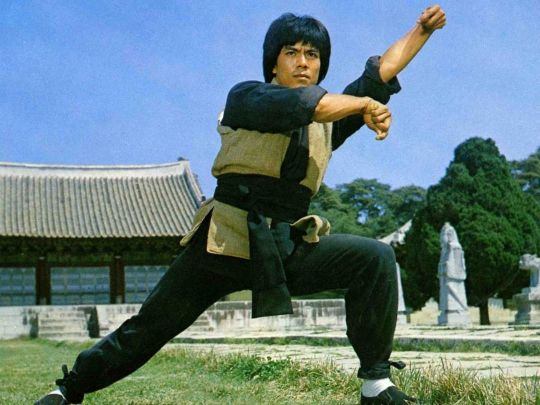
Repost from @wong_tao_legacy
''Sifu Wong Tao/WangTao'' was born as ''Tao Wong'' in Andong, South Korea🇰🇷 & originally he is Chinese🇨🇳 & son of famed & legendary actor George Wang (Wang Yie). Although being a son of a famed legendary actor, Wong Tao made a film career on his own. He took up Taekwondo lessons while he was staying at Italy🇮🇹 with his father & he earned his 2nd degree blackbelt by the time he reached U.S.🇺🇲 for his highschool education. He also participated in a Taekwondo tournament in U.S.🇺🇲winning the first place & then he decided to enter the film industry successfully earning his spot signing with Golden Harvest but that company didn't knew how to use a real martial artist's talent back then & relied on Chuck Norris' popularity. Producer Ng See Yuen noticed Wong Tao & told him to forget the Golden contract & work with him. Therefore Wong Tao returned to Asia & as he teamed up with Ng See Yuen & gave the cult classic hit The Secret Rivals it skyrocketed his martial arts movie career & the rest is history. Till to this date Wong Tao is active in the film industry & at present he is living in Taiwan🇹🇼. He always had a strong connection with Taiwan🇹🇼 as he made alot of Kung Fu movies from Taiwan🇹🇼. The purpose of this page is & always will be to highlight this humble legend's legacy & thanks to all his fans who supported him & still supports him🙏.
12 notes
·
View notes
Text
百家姓在全球各个华语地区的拼音
中文 中國大陸 台灣 香港 澳門 新加坡 馬來西亞 越南 韩国
1 赵 Zhao Chao Chiu Chio Chow Teoh/ Chew/ Tiew Trieu Jo/Cho
2 钱 Qian Chien Chin Chin Zee Chien/Chen Tien Joen/Chun
3 孙 Sun Sun Suen Sun Soon Soon/Sun/Shun/Song Ton Son
4 李 Li Li / Lee Li / Lee Lei Lee Lee/Li Ly Lee / Rhee/ Yi
5 周 Zhou Chou Chow / Chau Chao Chew Chew / Cheu / Chou / Chow / Chiew Chu Ju/Chu
6 吴 Wu Wu Ng Ng Goh Ng / Goh / Ngo/ Ngu Ngo Oh
7 郑 Zheng Cheng Cheng Cheang Tay Ching / Tang / Tey / Tay / Tee / Teh / Cheng / Chin / Chang / Chung / Chiang Trinh
8 王 Wang Wang Wong Vong / Wong Ong / Wong Ong / Ng / Wong / Wang / Bong / Heng Vuong Wang
9 冯 Feng Feng Fung Fong Foong/Fung/Fong Phung Pung
10 陈 Chen Chen Chan Chan Tan / Chan / Ting Chan / Chin / Chen / Tan / Tang / Ting / Sin Tran Jin/Chin
11 褚 Chu Chu Chu Chu Too/Toh
12 卫 Wei Wei Wai Wai Wee/Wei Vi Ui/Oui
13 蒋 Jiang Chiang Cheung Cheong Chiang/Cheong/Chiong Tuong Jang/Chang
14 沈 Shen Shen Shum / Sum Sam Sim Sim/Shim/Shun/Shum Sim
15 韩 Han Han Hon Hon Hon/Hong Han Han
16 杨 Yang Yang Yeung Ieong Yeo / Yong Yong / Yeo / Yeoh / Eow / Yeong / Yew Duong Yang
17 朱 Zhu Chu Chu Chu Choo Chu/Choo/Jee/Jeh Chau Chu/ Joo
18 秦 Qin Chin Chun Chin/Ch'ng Tan Jin/Chin
19 尤 You Yu Yau Iao Yew/You Vuu
20 许 Xu Hsu Hui Hoi Hee / Koh Khu / Khoo / Khor / Khow / Hoo / Hooi / Khaw / Hii Hu Heo/Huh
21 何 He Ho Ho Ho Hoh Ho/Hoh/Hor Ha Ha
22 吕 Lu Lu Lui Loi Loh/Lei/Lui/Lee La/Lu Yeo/Ryeo
23 施 Shi Shih Sze Si See/Sii/Sih
24 张 Zhang Chang Cheung Cheong Cheong Cheong / Chong / Teo / Chang / Teoh / Tiong Truong Jang/Chang
25 孔 Kong Kung Hung Hong Kong/Khong/Kung Khong Gong/Kong
26 曹 Cao Tsao Cho / Tso Chou Cheng/Choo/Cho/Chu/Chao Tao Cho/Jo
27 严 Yan Yen Yim Im Yam/Ngim Nghiem Im
28 华 Hua Hua Wa / Wah Wa Hoa Wha/Wah/Wa
29 金 Jin Chin Kam Kam Kim/King Kim Kim
30 魏 Wei Wei Ngai Ngai Ngui/Gui/Woi Nguy Ui/Oui
31 陶 Tao Tao To Tou Tho/To/Too/Toh Dao Do/To
32 姜 Jiang Chiang Keung Keong Khiang/Kiang Giang Kang/Gang
33 戚 Qi Chi Chik Chek Cheok
34 谢 Xie Hsieh Tse Che Cheah / Tay / Chia Cheah / Chiah / Chia / Seah / Sia / See Ta Sa
35 邹 Zou Tsou Chau / Chow Chao Chew/Chou/Chu
36 喻 Yu Yu Yu U Yu/Yho/Yuh You/Yu
37 柏 Bai Pai Pak Pak
38 水 Shui Shui Sui Soi Shu/Tshui
39 窦 Dou Tou Tau Tao
40 章 Zhang Chang Cheung Cheong Cheong/Chong/Teo/Tiong/Tong
[编辑] 百家姓41-80
中文 中國大陸 台灣 香港 澳門 新加坡 馬來西亞 越南 韩国
41 云 Yun Yun Wan Wan Woon/Wun/Yun/Yung
42 苏 Su Su So Sou Soh Soh / Saw / Soo To
43 潘 Pan Pan Poon / Pun Pun Phua Phua / Pan / Pang / Phang Phan Ban
44 葛 Ge Ko Kot Gal
45 奚 Xi Hsi Hai Kai Hae
46 范 Fan Fan Fan Fan Fung / Fam / Fang / Hwang Pham Bum
47 彭 Peng Peng Pang Pang Pang Peng/Pang/Phang Paeng
48 郎 Lang Lang Long Long Lang
49 鲁 Lu Lu Lo Lou Loo Loo/Loh/Lu Noh
50 韦 Wei Wei Wai Wai Wai/Wei/Vei Vi
51 昌 Chang Chang Cheung Cheong Cheong/Chang/Cang Xuong
52 马 Ma Ma Ma Ma Beh / Mah / Mha / Ma Ma Ma
53 苗 Miao Miao Miu Mio
54 凤 Feng Feng Fung Fong Fong
55 花 Hua Hua Fa Fa Faa/Fah/Fha Hoa
56 方 Fang Fang Fong Fong Pung / Fang / Fong / Phun / Huong Phuong Bang
57 俞 Yu Yu Yu U Je / Yii You/Yu
58 任 Ren Jen Yam Iam Yam/Ngam/Yim/Ngieng/Ngiam Nham Rim/Yim
59 袁 Yuan Yuan Yuen Un / Iun Yuan / Yuen / Ngen Vien Won
60 柳 Liu Liu Lau Lao Liew/Liu/Lew Lieu You/Yu/Ryu
61 酆 Feng Feng Fung Fong
62 鮑 Bao Pao Pau Pao
63 史 Shi Shih Sze Si Sa
64 唐 Tang Tang Tong Tong Thang / Thong / Tang / Tong / Thong Duong
65 費讀「秘」 Pei Pei Pei Pai
66 廉 Lian Lien Lim Lim
67 岑 Cen Tsen Sum / Shum Sam Sim
68 薛 Xue Hsueh Sit Sit Sik / Sit / Silk Seol/Sul
69 雷 Lei Lei Lui Loi Lui / Looi / Lewe / Lei
70 賀 He Ho Ho Ho Hor/Hoo
71 倪 Ni Ni Ngai Ngai Geh / Nga / Ngam
72 湯 Tang Tang Tong Tong Thong / Tang / Thang
73 滕 Teng Teng Tang Tang Thang
74 殷 Yin Yin Yan Ian Yam / Ngam
75 罗 Luo Lo Law / Lo Lo Lo / Lau / Low / Loh La Rah/Na
76 毕 Bi Pi But Pat Tat
77 郝 Hao Hao Kok
78 邬 Wu Wu Wu Vu / Wu Woo / Voo / Woh / Wu / Vu O
79 安 An An On On An An / Ahn
80 常 Chang Chang Sheung Seong
[编辑] 百家姓81-120
中文 中國大陸 台灣 香港 澳門 新加坡 馬來西亞 越南 韩国
81 乐 讀「洛」或「惡」 Yue Yueh Lok/ Ok Lok/ Ok
82 于 Yu Yu Yu U
83 时 Shi Shih See / Sze Si
84 傅 Fu Fu Foo Fu Fu/Foo/Foh
85 皮 Pi Pi Pei Pei
86 卞 Bian Pien Pin Pin Byun
87 齐 Qi Chi Chai Chai
88 康 Kang Kang Hong Hong Gang/Kang
89 伍 Wu Wu Ng Ng Ng Ng/Ngo/Ngoh/Wu/Wuh/Woo
90 余 Yu Yu Yu U Yee/Tsia/Tse
91 元 Yuan Yuan Yuen Un / Iun
92 卜 Bu Pu Puk Pok/Puu
93 顾 Gu Ku Koo Ku Koe
94 孟 Meng Meng Mang Mang Mang/Meng Maeng
95 平 Ping Ping Ping Peng
96 黄 Huang Huang Wong Vong / Wong Bong / Boong / Ng / Ong / Ooi / Wong / Wee Hwang
97 和 He Ho Wo Vo Hoo/Woh/Woo/Wo Hwa
98 穆 Mu Mu Muk
99 萧 Xiao Hsiao Shiu / Siu Sio Seow/Siew/Siau/Siaw/Sew/Siu/Seu
100 尹 Yin Yin Wan Wan Yoon
101 姚 Yao Yao Yiu Io Yeo Yeo / Yeoh / Yew / Yow
102 邵 Shao Shao Siu / Shiu Sio Shaw Shao/Shaw/Sao/Shau
103 湛 Zhan Chan Cham
104 汪 Wang Wang Wong Vong / Wong Wang/Wong/Vang
105 祁 Qi Chi Kei
106 毛 Mao Mao Mo Mou Bo / Boo / Moh / Moo Mo
107 禹 Yu Yu Yu U
108 狄 Di Ti Tik / Dick Tek
109 米 Mi Mi Mai Mai
110 贝 Bei Pei Pui Pui
111 明 Ming Ming Ming Meng Myeong /Myung
112 臧 Zang Tsang Chong
113 计 Ji Chi Kai Kai
114 伏 Fu Fu Fuk Fok
115 成 Cheng Cheng Shing / Sing Seng Sang/Shang//Tshan/Tshang Sung/ Seong
116 戴 Dai Tai Tai Tai Tai/Thai/Dai/Dhai
117 谈 Tan Tan Tam Tam
118 宋 Song Sung Sung Song Song Shong/Song/Sung Song
119 茅 Mao Mao Mau Mao
120 庞 Pang Pang Pong Pong Phong/Pong/Pang
2 notes
·
View notes
Text

Jet Li as Wong Fei Hung
Rosamund Kwan Chi Lam as Cousin Yee
1992’s “Once Upon A Time In China Part 2” 🇨🇳
Directed by Tsui Hark
Produced by NG See Yuen
#jet li#rosamund kwan#once upon a time in china#once upon a time in china 2#once upon a time in china II#chinese cinema#chinese actress#Chinese actor#chinese martial arts#Chinese martial arts cinema#Chinese action cinema#hong kong action#hong kong cinema#hong Kong action cinema#1992#90s action movies#Wong fei hung
1 note
·
View note
Text
New Post has been published on Harold Gross: The 5a.m. Critic
New Post has been published on http://literaryends.com/hgblog/warriors-of-the-future-ming-yat-zin-gei/
Warriors of the Future (Ming yat zin gei)
[2.5 stars]
What this is: a CGI and action wonder. What this isn’t: a good movie. Warriors is pure distraction with forced character moments. It tries to suggest a plot and relationships while the fight and danger go on, but it never really works. That doesn’t make it unwatchable, but it does diminish its return on your investment.
So, basically, pop the corn, pull out the snacks, and just strap in for the visual ride if you want to see the biggest Hong Kong f/x flick in years. And there is a LOT of f/x and action to feed that need. Which, I guess, shouldn’t be a huge surprise with this being Yuen Fai Ng’s first film directing after stepping out of the f/x bay. Just don’t expect anything else…including a full resolution.
0 notes
Photo
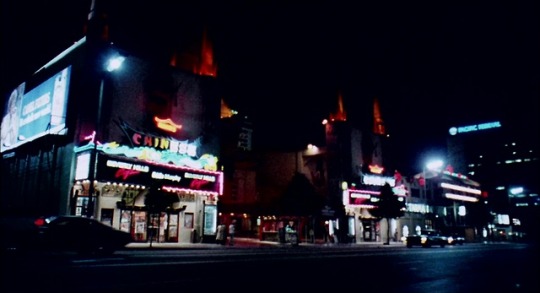
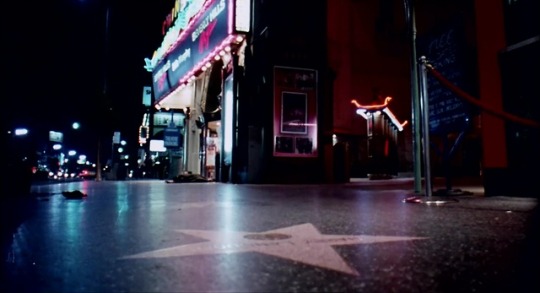
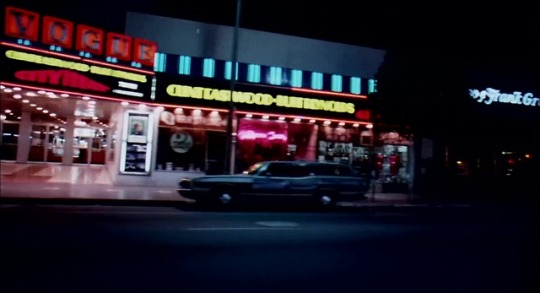
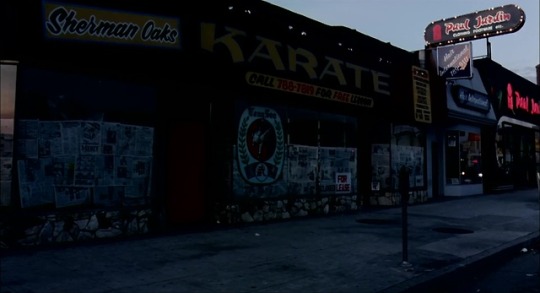
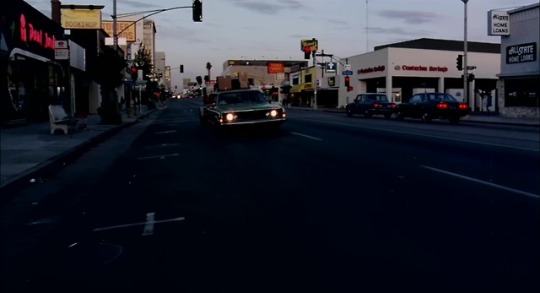

Los Angeles in No Retreat, No Surrender (1986)
#no retreat no surrender#1986#los angeles#1980s#corey yuen#ng see-yuen#jean-claude van damme#film#action film#martial arts#los angeles county#vintage los angeles
212 notes
·
View notes
Photo
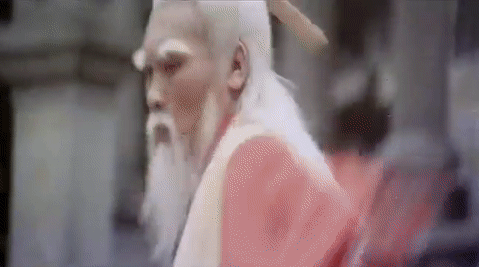
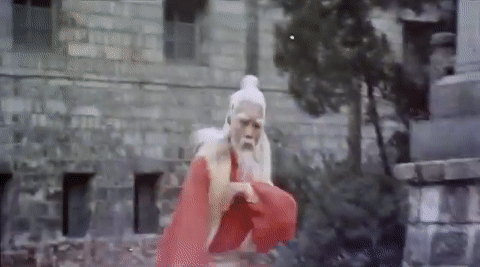
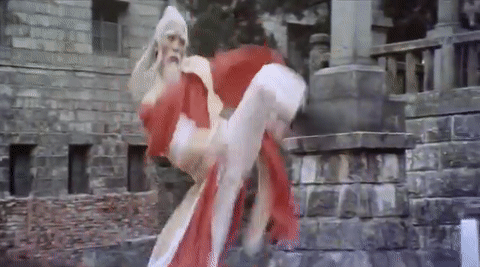
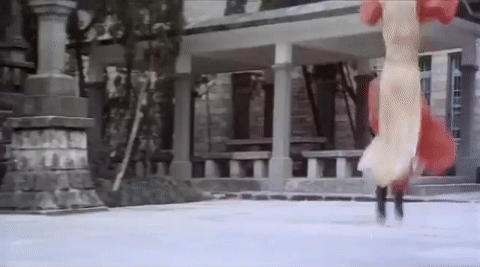
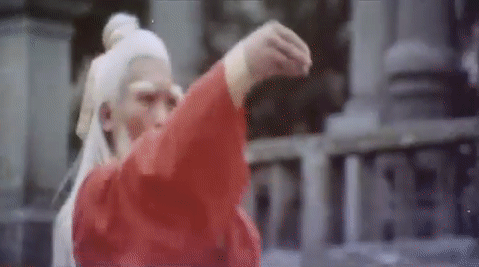
The Secret Rivals Part II (1977)
#The Secret Rivals Part II#The Secret Rivals Part 2#Secret Rivals 2#Hwang Jang Lee#Ng See Yuen#Yuen Woo Ping#Tino Wong#John Liu#Kung fu cinema#Kung fu movies#Kung fu#Martial arts#Martial arts movies#Gif#Gifs
339 notes
·
View notes
Text
The Invincible Armour (1977)
Pretty good old school "Kung Fu" flick. Plot and characterization are thin so it drags at times. The characters aren't entirely "stock" characters, which is nice. The combat is first rate with occasional creative surprises.
The Invincible Armour (1977)
Director: See-Yuen Ng
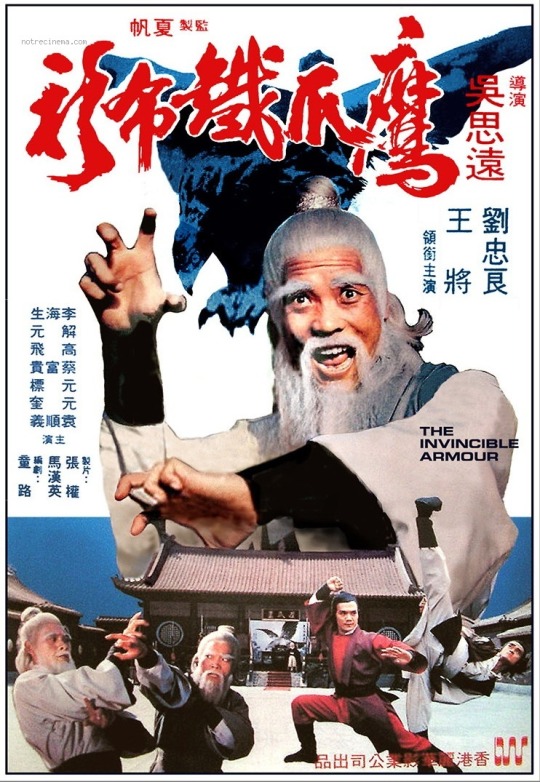
1 note
·
View note
Photo
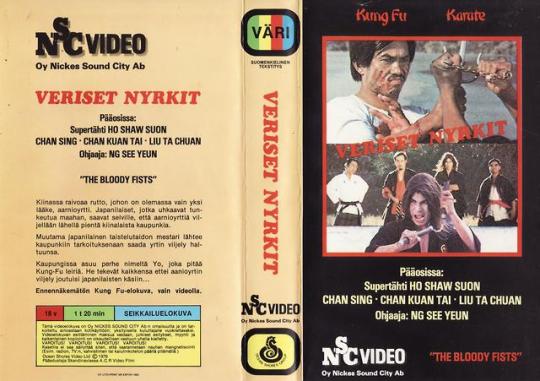
Veriset nyrkit / Bloody Fists, The (1972) Nickes Sound City https://www.videospace.fi/release/veriset_nyrkit_vhs_nickes_sound_city_finland
#Videospace#VHS#Veriset nyrkit#Bloody Fists#The#See-Yuen Ng#Sing Chen#Kuan Tai Chen#Ta Chuan Liu#VHS tapes#VHS art#VHS cover
1 note
·
View note
Text
Movie Review | Game of Death II (Ng, 1981)

Perhaps my recent viewing of Game of Death has softened me to the idea of trampling all over Bruce Lee’s grave, but I did not find this movie’s first act as trying this time around. Yes, there is the extremely objectionable use of real footage from Lee’s open casket funeral, and yes, there are awkward inserts of the real Lee (dubbed so that he sounds the same as all the other male characters and nothing like his actual voice) when the movie goes in for close-ups. But the movie is slapdash enough about trying to disguise the lead actor (there are no fake beards like the other film) that it mostly stops trying during the fight scenes, of which there are a few, and opts to just pull back the camera and take it easy on the cutting. There is some novelty in seeing Lee as a child (the inclusion of this footage is explained by Lee’s character reminiscing about how much of a troublemaker he was at a young age), and the scene in the Japanese nightclub has a fun ambience (as well as a poster of Momoe Yamaguchi flashing a million dollar smile).
Of course, the movie does get immeasurably better once it kills off “Lee” and switches to that of his brother, who (surprise, surprise) is played by the same actor and can now be shot without trying to disguise him. Lee’s character was investigating the death of his friend Hwang Jang-Lee when he was killed (while dangling from a coffin being stolen from the funeral by helicopter), so it’s up to his brother to find out who’s behind his death. This involves visiting a secluded compound presided over by a white man in a tracksuit (Roy Horan, likely cast for his resemblance to Robert Wall but gets in a sweet fight scene nonetheless) who has a fondness for deadly martial arts and exotic animals. We see evidence of the latter with the monkey he carries with him and a tour of his facility where he points out different animals he is fond of (his menagerie includes peacocks and lions, both of which influence his fighting style). He is frequently accompanied by a sinister assistant who may or may not have just one arm. In my initial viewing I was not particularly attentive and assumed that he magically grew back his arm in the middle of a fight scene. This time around it still wasn’t clear to me whether he had been hiding the other arm the whole time or that he actually could grow it back as he pleased. Many famous, renowned films have ambiguous endings; Game of Death II uses ambiguity to complicate our relationship with one character in particular.
My favourite moment comes two thirds into the movie, where the hero, at the sight of a naked woman, has flashbacks to a dirty book and soon after is attacked by a man in a lion suit. It’s a culmination of a few threads in the film (the brother’s differing attitudes towards sex compared with Lee’s character, who is seen early in the film throwing away said dirty book and a bunch of porno magazines; also lions) and is still one of the funnier things I’ve seen in a movie. (This is another instance where the movie uses ambiguity, as it’s not entirely clear if it’s supposed to be a real lion or someone disguised as one.) The climax of the film takes the tower concept from the earlier film, literally turns it upside down and uses it as a launching pad for cheapo Bond-style theatrics. I won’t detail exactly what goes down, but a real flair for camp and a number of fast moving fights choreographed by Yuen Woo-Ping make this all highly enjoyable. Now, if you’re worried that you need to see the original Game of Death to get anything out of this, fear not, as the movies are hardly related. Technically “Lee” is playing the same character in both films (and the lead actor, Kim Tai-jong, doubles for Lee in both films), but there are no story elements carried over. The more practical explanation was that Golden Harvest probably wanted to make their Brucesploitation entries feel more official, and as the last film had great “new” footage of the real Lee, naming this one similarly would likely get more asses in seats. Given that I first saw this because I mistakenly rented it thinking I’d picked up the other film, it worked in at least one case.
2 notes
·
View notes
Photo

BRUCE LEE THE MAN THE MYTH (1977) - TRIBUTE TO NEAL ADAMS (Part 2/10)
in the 70′s. NEAL ADAMS drew many Martial Arts stories for Marvel magazine Deadly Hands Of Kung-Fu (see Part 8) along with many paintings of Bruce Lee as his neo-realistic style and fluidity of movements perfectly captured the strength and feline beauty of Martial Arts. He was also asked to paint many movie posters for such movies which we present several in this blog including the US poster for the 1977 Hong Kong Bruceploitation movie featuring Bruce LI!!!!
Director: See-Yuen Ng
Actors: Bruce Li
R.I.P NEAL ADAMS
All our NEAL ADAMS posters are here
ALL OUR MARTIAL ARTS-BRUCEPLOITATION posters are here
If you like this entry, check the other 9 parts of this week’s Blog as well as our Blog Archives
All our NEW POSTERS are here
All our ON SALE posters are here
The poster above courtesy of ILLUSTRACTION GALLERY
#illustraction gallery#illustraction#neal adams#Neal Adams poster#bruce lee the man the myth#Bruce Lee#bruce li#1977#bruceploitation#movies#martial arts#martial arts movies#Movie Poster#one sheet poster#vintage#film
19 notes
·
View notes
Photo
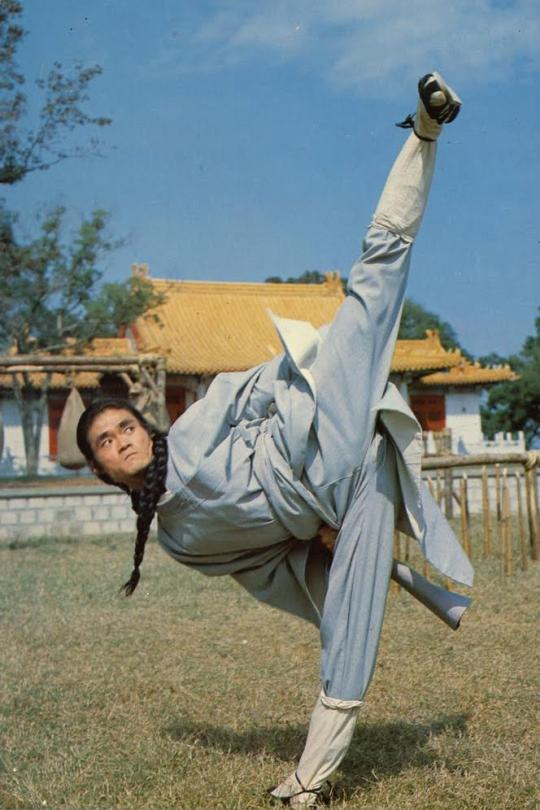
Liu Chungliang (Commonly credited as John Liu )
Liu made his debut in 1972 movie Great Boxer as the character Yanoryu Karateka, although it flopped at the box office. His real success came from the movie Secret Rivals, alongside with Hwang Jang-lee and Don Wong Tao. Director Ng See-yuen furthermore brought Liu to the attention, with the likes of films such as Snuff Bottle Connection and Secret Rivals 2. Combined with amazing choreography from the likes of Yuen Woo-ping, Corey Yuen and Alan Chui Chung-San, Liu's kicking brought him notoriety.
25 notes
·
View notes
Photo
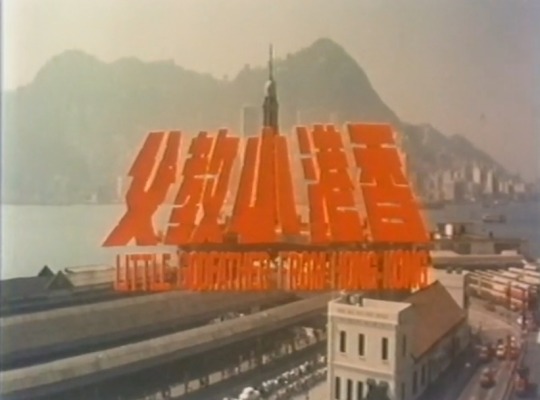
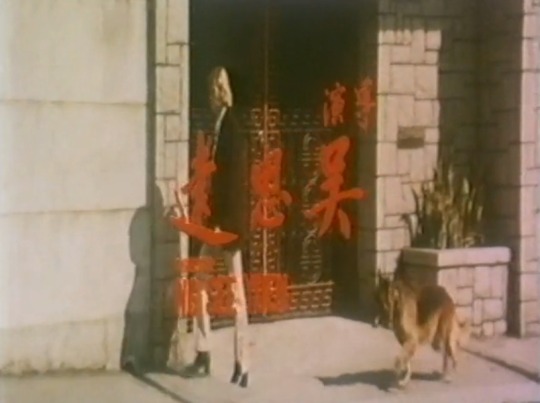
香港小教父 〔Little Godfather From Hong Kong〕(1974) 🇭🇰 Dir. 呉思遠 (See-Yuen Ng)
0 notes
Text

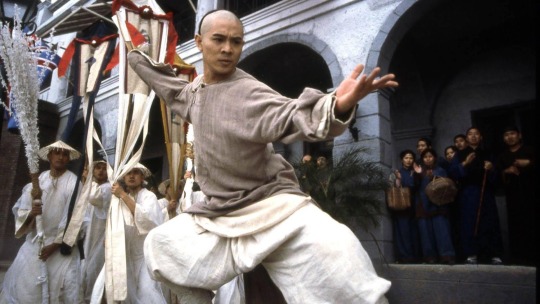
Jet Li as Wong Fei Hung
1992’s “Once Upon A Time In China 2”
Dir. Tsui Hark
Action choreography Woo Ping Yuen
Produced by Ng See Yuen
#jet li#chinese action cinema#chinese martial arts#tsui hark#once upon a time in China#hong kong cinema#hong kong action cinema#1992#yuen woo ping#donnie yen#wong fei hung
9 notes
·
View notes
Photo
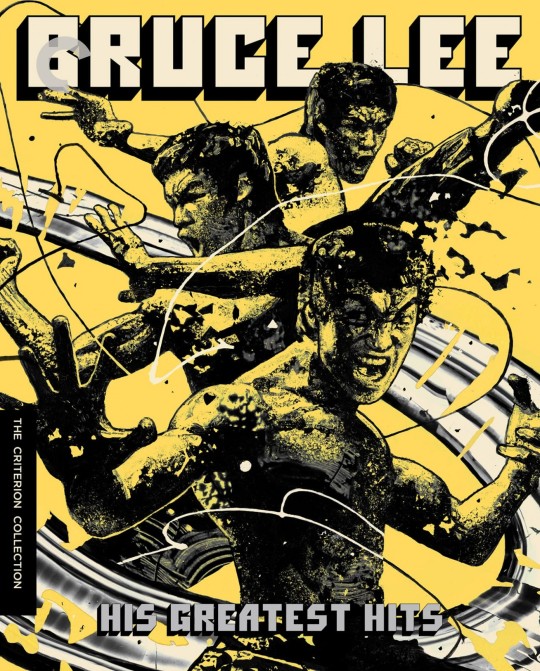
Bruce Lee: His Greatest Hits will be released on July 14 via The Criterion Collection. The Blu-ray box set includes five martial arts classics starring Bruce Lee: The Big Boss, Fist of Fury, The Way of the Dragon, Enter the Dragon, and Game of Death.
1971's The Big Boss is directed by Wei Lo and stars Lee, Maria Yi, James Tien and Tony Liu. 1972's Fist of Fury (also known as The Chinese Connection) is directed by Lo Wei and stars Lee, Nora Miao, Maria Yi, and James Tien.
1972's The Way of the Dragon is written and directed by Lee, who stars with Nora Miao, Ping Ou Wei, Robert Wall, and Chuck Norris. 1973's Enter the Dragon is directed by Robert Clouse and stars Lee with John Saxon, Ahna Capri, Robert Wall, Kien Shih, and Jim Kelly.
1978's Game of Death is written and directed by Lee, with Robert Clouse completing the film after Lee's death. Lee stars with Gig Young, Dean Jagger, Colleen Camp, Hugh O'Brian, and Robert Wall.
The Big Boss, Fist of Fury, Game of Death, and The Way of the Dragon have been newly restored in 4K with uncompressed original mono audio. Enter the Dragon includes its 102-minute special edition version and its 99-minute theatrical version, each restored in 2K.
The set also features Game of Death II, the 1981 sequel to Game of Death directed by Ng See-yuen, and Game of Death Redux, a new presentation of Lee’s original Game of Death footage, produced by Alan Canvan.
In addition to the original Japanese soundtracks, alternate audio is included for the films, including the English dubs and a 5.1 surround soundtrack for Enter the Dragon’s special edition.
Gian Galang designed the cover art. Special features are listed below, where you can also see the individual covers.
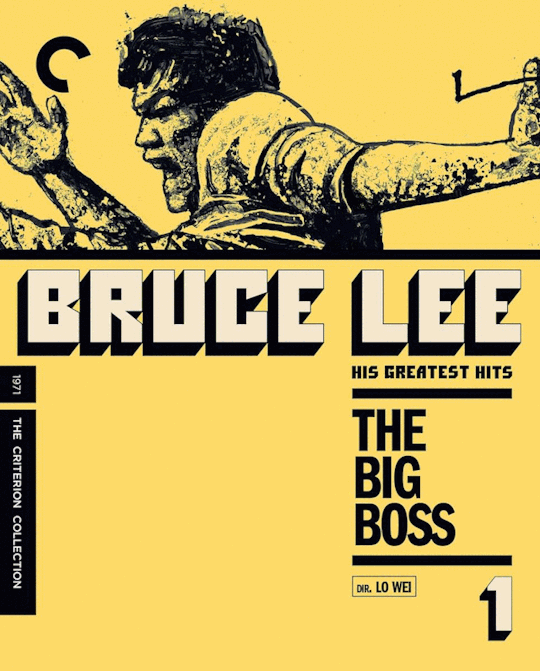
Special features:
The Big Boss audio commentary by Bruce Lee expert Brandon Bentley
The Big Boss audio commentary by Hong Kong film expert Mike Leeder
Fist of Fury audio commentary by Hong Kong film expert Mike Leeder
Game of Death audio commentary by Hong Kong film expert Mike Leeder
The Way of the Dragon audio commentary by Hong Kong film expert Mike Leeder
Enter the Dragon special edition audio commentary by producer Paul Heller
Interviews on all five films with Lee biographer Matthew Polly
Interview with producer Andre Morgan about Golden Harvest, the company behind Hong Kong’s top martial-arts stars, including Lee
Featurette on English-language dubbing with voice performers Michael Kaye (Lee’s English-speaking voice in Fist of Fury) and Vaughan Savidge
Interview with author Grady Hendrix about the Bruceploitation subgenre and a selection of Bruceploitation trailers
Blood and Steel - 2004 Enter the Dragon making-of documentary
Bruce Lee: The Man and the Legend - 1973 Bruce Lee documentary
Bruce Lee: In His Own Words - 1998 featurette
Interviews with Linda Lee Cadwell, Lee’s widow, and many of Lee’s collaborators and admirers, including actors Jon T. Benn, Riki Hashimoto, Nora Miao, Robert Wall, Yuen Wah, and Simon Yam and directors Clarence Fok, Sammo Hung, and Wong Jing
Promotional materials
Booklet featuring an essay by critic Jeff Chang
In the early 1970s, a kung-fu dynamo named Bruce Lee side-kicked his way onto the screen and straight into pop-culture immortality. With his magnetic screen presence, tightly coiled intensity, and superhuman martial-arts prowess, Lee was an icon who conquered both Hong Kong and Hollywood cinema, and transformed the art of the action film in the process. This collection brings together the five films that define the Lee legend: furiously exciting fist-fliers propelled by his innovative choreography, unique martial-arts philosophy, and whirlwind fighting style. Though he completed only a handful of films while at the peak of his stardom before his untimely death at age thirty-two, Lee left behind a monumental legacy as both a consummate entertainer and a supremely disciplined artist who made Hong Kong action cinema a sensation the world over.
#bruce lee#enter the dragon#game of death#the way of the dragon#fist of fury#the big boss#criterion collection#the criterion collection#criterion#dvd#gift#bruceploitation#grady hendrix#martial arts#john saxon#gian galang
62 notes
·
View notes